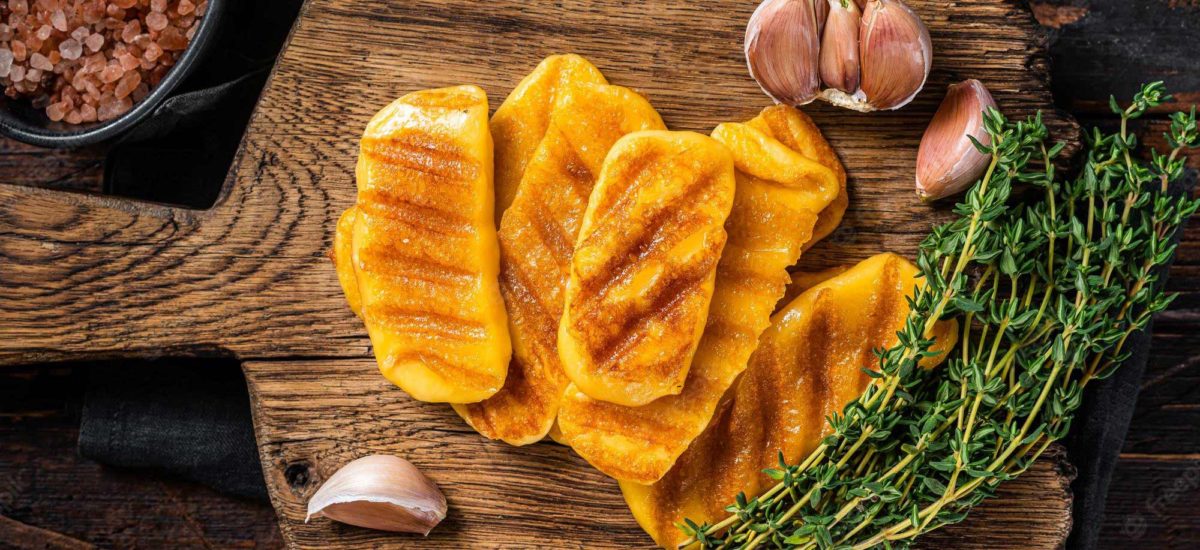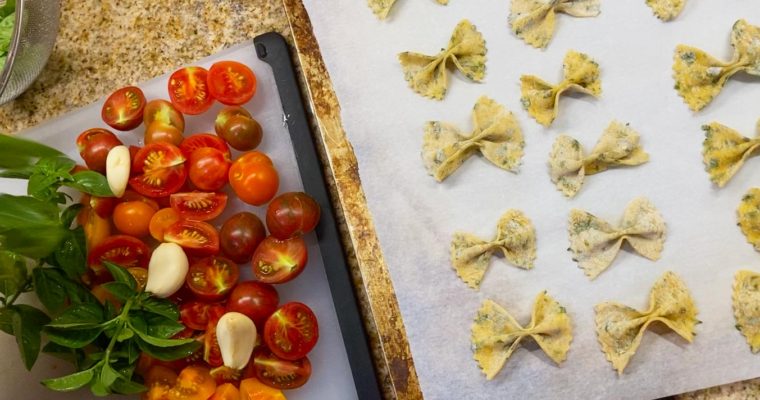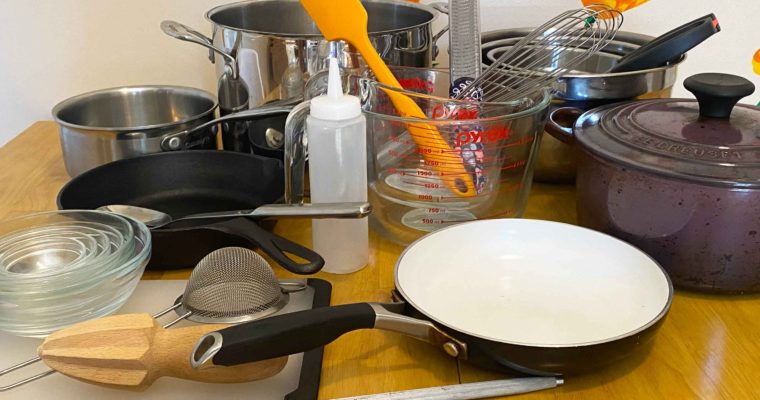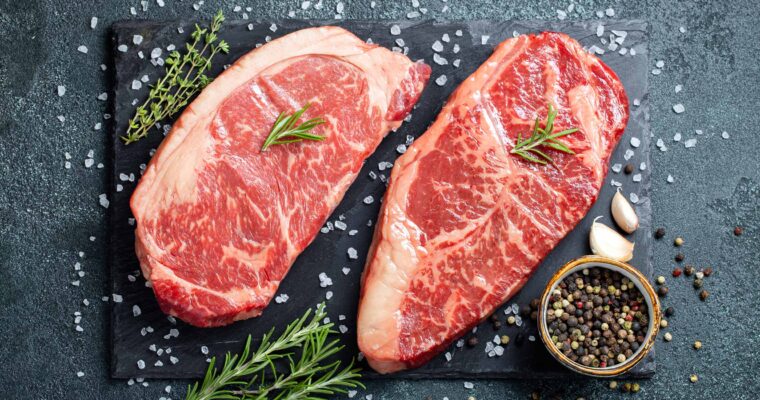Halloumi is a truly tasty cheese featured in more and more recipes each year. It is a semi-soft Cypriot cheese made from a mixture of goat’s milk and sheep’s milk.
Often described as having a “squeaky” or rubbery texture, it has a high melting point, which allows it to cook at high temperatures without melting. It’s mostly served grilled or fried and its mild flavor allows it to pair well in salads and sandwiches.
Even though this type of cheese is becoming available at many grocery stores, it’s not always in stock, which is why we have the 15 best cheese substitutes for halloumi below.
Depending on its intended use, there are many ways to go for the best option for the type of cheese to use as a substitute. This list will give you the best halloumi substitutes for any situation.
15 Best Cheese Substitutes for Halloumi
1. Paneer (Indian cottage cheese)
Paneer is a semi-soft, sour milk cheese common in the Indian subcontinent. The curdling agent is typically lemon juice or vinegar, and is used to separate the cheese curds from the whey. It’s the most common cheese used in Indian cuisine and is an integral part of many dishes.
Much like halloumi, Paneer is a great frying and grilling cheese that also pairs well with spice rubs. It’s found in many fresh dishes and savory recipes, such as saag paneer and paneer tikka. And because it has a mild flavor and works well with high heat, Paneer is an excellent substitute for halloumi.
2. Feta
A brined, white cheese with a slightly tangy, salty taste, feta is an extremely common cheese. That and it happens to be a mild, goat and sheep milk Greek cheese, and it pairs wonderfully in salads, make it a great substitute for halloumi.
Its applications go far beyond as well. Unlike halloumi, feta has a lower melting point and because of this, it’s used in dishes such as spanakopita “spinach pie”, tiropita “cheese pie”, and omelets.
3. Leipäjuusto (bread cheese)
Bread cheese, as it’s commonly known in the US, is a Finnish fresh cheese made from cow’s milk. It has a very similar texture and a very high melting point, which makes it a fine halloumi alternative.
Interestingly, it’s sold already grilled or baked, which gives it its trademark look. So if your recipe calls for it, you’re already a step ahead! Just cut it up and use it as is, temper it on the counter, or heat it up in the oven.
4. Queso Para Freir
Literally “cheese for frying,” queso para freir is a Mexican cheese with a mild, salty flavor. It’s great at high temperatures like on the grill or a frying pan and can also be crumbled and served in a salad. After frying, the outside will have a beautiful golden brown crust, while the inside remains creamy.
For all these reasons, it’s not only a delicious cheese on its own but an ideal halloumi substitute. Its ability to check so many boxes related to halloumi qualities and bring its own unique qualities really gives this cheese a bump, if you can find it.
5. Mozzarella
An extremely common Italian cheese, mozzarella is a fresh cheese with a mild flavor and a semi-soft texture. Commonly made from buffalo milk in Italy, in the United States, cow’s milk is typically used.
Depending on the recipe when substituting it for halloumi, you have some options for which type of mozzarella would make a good choice. Fresh mozzarella comes in a few varieties – essentially different sized balls – so this gives you a number of options depending on the recipe.
Ciliegine is mozzarella made to be about the size of a marble. This is one of the most common types of smaller mozzarella and is typically used in caprese salad. Mozzarella also comes in a smoked variety as well, though this would rarely be a good substitute for halloumi.
The other great option is to use low-moisture mozzarella, which comes in blocks or shredded. This would be the best thing if you’re looking to easily slice it for a sandwich or melt it over a dish and don’t want the higher moisture content.
6. Kasseri
Kasseri is a pale yellow, semi-hard cheese from Greece made from sheep and goat milk. A cheese with quite a long history, Kasseri derives its name from the Hebrew word for kosher due to its lack of rennet when first invented.
Unlike the previous cheeses on this list, it has a hard rind and a smooth, chewy texture that’s not crumbly like feta and some other cheeses on this list. It is great served fried or in a sandwich.
7. Manouri
Another Greek cheese made from sheep and goat milk, manouri is actually made from the whey in the production of feta. Once you make feta, you’re ready to start making manouri!
Though it is similar to feta, it has a creamier texture and a less sour and salty taste. So if you’re preferring a creamy cheese with a milder flavor, this is the one for you. Given the similarities, you can use manouri in the same dishes as you would feta.
8. Queso Panela/Queso Canasta
Queso panela is a cow milk Mexican cheese that’s somewhat of a cross between halloumi, paneer, and mozzarella. The name queso canasta is derived from the Greek word for basket cheese, and it’s commonly served in Mexican dishes such as quesadillas and nopal salads.
It’s a mild cheese that can easily take on other flavors in the form of rubs and marinades. Often, this can be a paste of chili pepper and garlic. It can also be fried or grilled like halloumi while keeping its shape as it also has a high melting point.
9. Provolone
Provolone is an Italian cheese that comes in two main varieties: provolone piccante and provolone dolce. The former is aged a minimum of four months, making it a cheese with a semi-hard texture and a sharp flavor. The latter has a firm, but much softer texture and a milder flavor, making it the better halloumi alternative.
Provolone dolce is a cow’s milk cheese that has a mild, slightly sweet flavor and cuts very easily. It can also be paired with spices and herbs as well. It does, however, have a much lower melting point than halloumi, so keep this in mind when using it in recipes.
10. Kefalotyri
Kefalotyri is a hard, salty cheese from Greece made from sheep and/or goat’s milk. It’s a very hard cheese and can be served as is, fried, or grilled, making it a good substitute for halloumi. Paired with feta, kefalotyri is often found in the popular Greek dish spanakopita. It can be found in gourmet and specialty stores.
11. Kefalograviera
A cheese with a very similar flavor to Kefalotyri, Kefalograviera is a hard Greek cheese with a salty taste. Made from sheep and/or goat’s milk, it too is great when fried and is commonly used in the Greek dish saganaki, a fried cheese appetizer.
12. Queso Blanco
Queso Blanco can refer to a host of cheeses from Latin America, such as queso fresco. Often made from cow’s milk, it tends to have a milder flavor and is often used on top of many Latin dishes or eaten as is. It also typically has a high melting point, so it’s also a great cheese for frying or grilling.
13. Graviera
Graviera is a Greek, sheep’s milk cheese with a hard texture. With similar characteristics to gruyère and even deriving its name from the Swiss cheese, Graviera has a slightly sweet flavor and is a versatile cheese. It can be grated over dishes, served in salads, and baked/fried.
14. Anari
Anari is a fresh, mild cheese from the island of Cyprus made from goat or sheep’s milk. Its texture can vary from very soft to very hard, so it’s very important, especially with this cheese, to know its use before buying it. For using it as an ideal halloumi substitute, picking a firmness somewhere in the middle would be an excellent choice.
15. Queijo coalho
Queijo coalho is a firm texture, Brazilian cheese that is often described as squeaky. Much like halloumi, it has a higher melting point than most cheese and is often grilled. It also works very well with spice rubs and sauces.
How do I choose?
The cheese you ultimately choose should be based on a few factors:
Availability
The most important factor is “can I buy this cheese?”. While some of the kinds of cheese on this list are widely available at most grocery stores, many are only available at gourmet or specialty markets. However, where you live is one of the biggest factors in the availability of each cheese.
Recipe
How is the recipe using the cheese? Whether it’s served sliced on a sandwich, cubed in a salad, or presented in other ways, will play a big part in the cheese you choose. Do you need it to have a high melting point? Is a mild taste the most important factor? Or do you need it to pair well with spices? Answering these questions will help you make the perfect choice.
Personal Taste
Your personal preferences and those you’re serving also play a large part in the cheese you choose as well. Knowing yourself and your audience is extremely helpful not only in this case, but also when choosing dishes in general. Flavor preferences, allergies/dietary restrictions, and other factors are all important considerations.
If you have anything to add, please let us know in the comments below!






1 thought on “15 Best Cheese Substitutes for Halloumi”
Comments are closed.